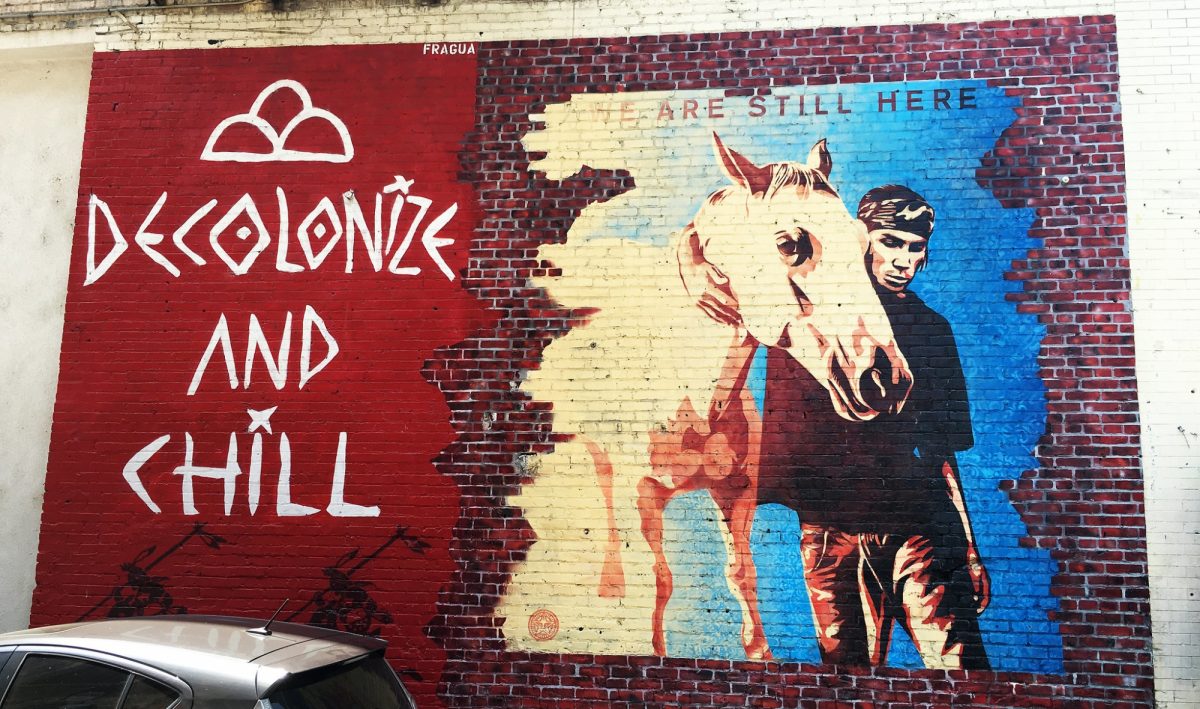
"Decolonize and Chill - We are Still Here" // Image: wiredforlego, Flickr
Lumbering towards a decolonized society
Although she harbours the healthy skepticism of a researcher, Iloradanon Efimoff remains hopeful that Canada is lumbering towards a decolonized—or at least Indigenized—society.
Efimoff, an Indigenous PhD candidate and Vanier Scholar in UM’s psychology department, studies ways to make people less racist. We last wrote about her in the alumni magazine’s Deconstructing Privilege article. Not everything we spoke about made it into that article, however, and we now publish other parts of our conversation because on Wednesday, Dec. 11, President David Barnard will moderate the next Visionary Conversations, which will explore decolonization in Canada.
Professor of Native studies Dr. Emma LaRoque [MA/80, PhD/99], and Dr. Carey Miller, Head of Native studies, were also featured in Deconstructing Privilege article and they will join Dr. Katherine Starzyk, director of the UM’s Social Justice Laboratory (and Efimoff’s academic supervisor), and Dr. Michael Yellow Bird, Dean of the Faculty of Social Work, on the Visionary Conversations panel.
They will surely engage the audience with profound insights into the realities of decolonizing Canada and we encourage you to attend the free event at the Canadian Museum for Human Rights. For now, though, we provide an appetizer of sorts, by presenting Efimoff’s thoughts.
UM Today: Do you think we are decolonizing at the university, or throughout society?
Iloradanon Efimoff: No.
Why not?
I think that’s a goal, but decolonizing is a big word. Think of it. It is reversing colonization. So many things would have to happen. I don’t think that is what we are doing. What we’re doing is Indigenizing, which is somewhere between tokenism and decolonizing. There are some meaningful changes happening, but it depends on how you view it.
What sort of meaningful changes are you seeing?
Things like the SAGE program. That’s an Aboriginal graduate student support program. So, in building a program that Indigenous graduate students can access, we’re making a change in the system. It’s free and any Indigenous student can access it. It’s based on what Indigenous students want to do. It’s coordinated by an Indigenous woman. So that’s one example.
Land acknowledgments are important.
Having reserved seats for Indigenous students in programs like medicine is important.
So there are things that are meaningful and they border on systemic changes, so those might be leaning towards decolonization, but I have a hard time even understanding what people necessarily mean when we talk about “decolonization.” What does that word actually to mean to people? And I think it means a lot of different things to a lot of people. I think some people view land acknowledgements as decolonization. And I think some people think of universities as colonial institutions or bodies that perpetuate colonization; so to decolonize, we would have to completely dismantle them. There are vast differences in what people think decolonization is. And I’m not entirely sure where I fall on the spectrum.
…There’s a lot of challenges. It’s really easy to become hopeless but it’s really, really important to remain hopeful and optimistic and to continue to work towards the world you want to live in.






